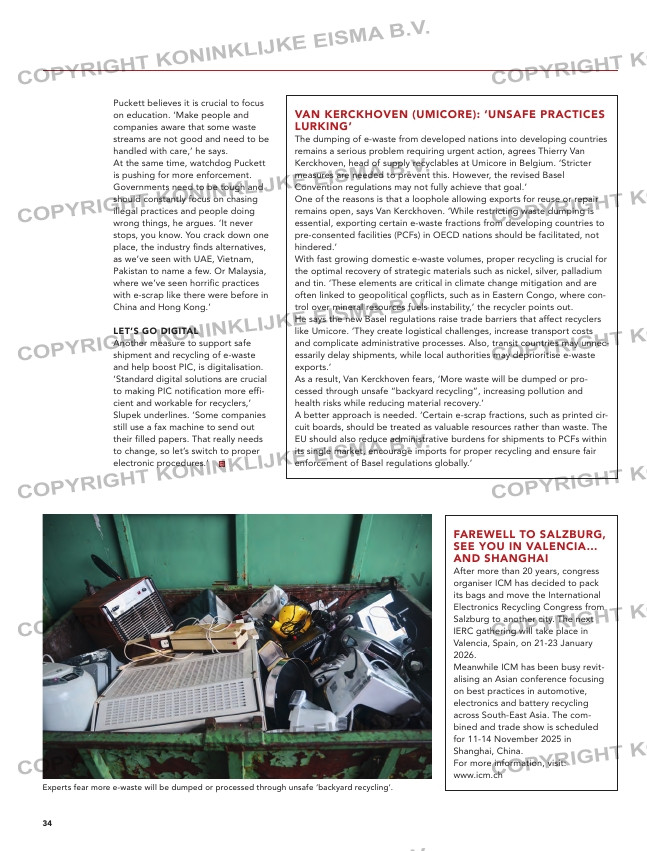Page 34 from: March/April issue 2025

34
Puckett believes it is crucial to focus
on education. ‘Make people and
companies aware that some waste
streams are not good and need to be
handled with care,’ he says.
At the same time, watchdog Puckett
is pushing for more enforcement.
Governments need to be tough and
should constantly focus on chasing
illegal practices and people doing
wrong things, he argues. ‘It never
stops, you know. You crack down one
place, the industry finds alternatives,
as we’ve seen with UAE, Vietnam,
Pakistan to name a few. Or Malaysia,
where we’ve seen horrific practices
with e-scrap like there were before in
China and Hong Kong.’
LET’S GO DIGITAL
Another measure to support safe
shipment and recycling of e-waste
and help boost PIC, is digitalisation.
‘Standard digital solutions are crucial
to making PIC notification more effi-
cient and workable for recyclers,’
Slupek underlines. ‘Some companies
still use a fax machine to send out
their filled papers. That really needs
to change, so let’s switch to proper
electronic procedures.’
VAN KERCKHOVEN (UMICORE): ‘UNSAFE PRACTICES
LURKING’
The dumping of e-waste from developed nations into developing countries
remains a serious problem requiring urgent action, agrees Thierry Van
Kerckhoven, head of supply recyclables at Umicore in Belgium. ‘Stricter
measures are needed to prevent this. However, the revised Basel
Convention regulations may not fully achieve that goal.’
One of the reasons is that a loophole allowing exports for reuse or repair
remains open, says Van Kerckhoven. ‘While restricting waste dumping is
essential, exporting certain e-waste fractions from developing countries to
pre-consented facilities (PCFs) in OECD nations should be facilitated, not
hindered.’
With fast growing domestic e-waste volumes, proper recycling is crucial for
the optimal recovery of strategic materials such as nickel, silver, palladium
and tin. ‘These elements are critical in climate change mitigation and are
often linked to geopolitical conflicts, such as in Eastern Congo, where con-
trol over mineral resources fuels instability,’ the recycler points out.
He says the new Basel regulations raise trade barriers that affect recyclers
like Umicore. ‘They create logistical challenges, increase transport costs
and complicate administrative processes. Also, transit countries may unnec-
essarily delay shipments, while local authorities may deprioritise e-waste
exports.’
As a result, Van Kerckhoven fears, ‘More waste will be dumped or pro-
cessed through unsafe “backyard recycling”, increasing pollution and
health risks while reducing material recovery.’
A better approach is needed. ‘Certain e-scrap fractions, such as printed cir-
cuit boards, should be treated as valuable resources rather than waste. The
EU should also reduce administrative burdens for shipments to PCFs within
its single market, encourage imports for proper recycling and ensure fair
enforcement of Basel regulations globally.’
FAREWELL TO SALZBURG,
SEE YOU IN VALENCIA…
AND SHANGHAI
After more than 20 years, congress
organiser ICM has decided to pack
its bags and move the International
Electronics Recycling Congress from
Salzburg to another city. The next
IERC gathering will take place in
Valencia, Spain, on 21-23 January
2026.
Meanwhile ICM has been busy revit-
alising an Asian conference focusing
on best practices in automotive,
electronics and battery recycling
across South-East Asia. The com-
bined and trade show is scheduled
for 11-14 November 2025 in
Shanghai, China.
For more information, visit:
www.icm.ch
Experts fear more e-waste will be dumped or processed through unsafe ‘backyard recycling’.
32-33-34_ierc2025report.indd 34 06-03-2025 12:10



